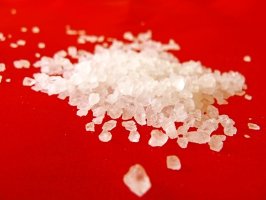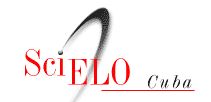
El exceso de sodio en la dieta es perjudicial para la salud
Resumen
Disminuir el consumo excesivo de sal en la dieta es una de las intervenciones críticas para reducir el impacto de las enfermedades cardiovasculares a nivel poblacional. Partiendo de esta aseveración, se emiten comentarios acerca del artículo El consumo de sal ¿Riesgo o necesidad?, publicado en el número anterior de la revista. Se enfatiza en el debate científico que trae consigo esta problemática, a la luz de la confrontación de estudios muy recientes. Por último, se expresa la necesidad de evitar mensajes contradictorios o ambiguos, sobre todo, cuando estos serán divulgados mediante fuentes científicas.
Palabras clave
Referencias
Diez y Martínez de la Cotera E, Benet Rodríguez M, Morejón Giraldoni AF, García Núñez R. El consumo de sal ¿Riesgo o necesidad? Revista Finlay[revista en Internet]. 2011[citado: 12 Ene 2012];1(3):[aprox. 12p]. Disponible en: http://www.revfinlay.sld.cu/index.php/finlay/article/view/73/99.
Stolarz-Skrzypek K, Kuznetsova T, Thijs L, Tikhonoff V, Seidlerová J, Richart T, et at. Fatal and nonfatal outcomes, incidence of hypertension, and blood pressure changes in relation to urinary sodium excretion. JAMA. 2011;305(11):1777-85.
Taylor RS, Ashton KE, Moxham T, Hooper L, Ebrahim S. Reduced dietary salt for the prevention of cardiovascular disease: a meta-analysis of randomized controlled trials (Cochrane Review). Am J Hypertens. 2011;24(8):843-53.
Salt and cardiovascular disease mortality [Editorial]. Lancet. 2011;377(9778):1626.
Fahimi S. Salt and Health: A New Paradigm or Bad Science? Am J Hypertens 2012;25(1):20
Campbell N, Correa-Rotter R, Neal B, Cappuccio FP. New evidence relating to the health impact of reducing salt intake. Nutrition, Metabolism & Cardiovascular Diseases. 2011;21(9):1617-19.
Geleijnse JM, Kok FJ, Grobbee DE. Blood pressure response to changes in sodium and potassium intake: a metaregression analysis of randomised trials. J Hum Hypertens. 2003;17(7):471-80.
Karppanen H, Mervaala E. Sodium intake and hypertension. Prog Cardiovasc Dis. 2006; 49(2):59-75.
General Assembly of the United Nations. Political Declaration of the High-level Meeting of the General Assembly on the Prevention and Control of Non- Communicable Diseases. A/66/L.1 [Internet]. New York: General Assembly of the United Nations; 2011 [citado: 26 Sep 2011]. Disponible en: http://www.un.org/ga/search/view_doc.asp?symbol=a/66/l.1.
World Health Organization. A comprehensive global monitoring framework and voluntary global targets for the prevention and control of NCDs [Internet]. Geneva: WHO; 2011[citado: 12 Ene 2012]. Disponible en: http://www.who.int/nmh/events/2011/consultation_dec_2011/WHO_Discussion_Paper_FINAL.pdf.
Appel LJ, Frohlich ED, Hatt JE, Pearson TA, Sacco RL, Seals DR, et al. The importance of population-wide sodium reduction as a means to prevent cardiovascular disease and stroke: a call to action from the American Heart Association. Circulation 2011;123(10):1138-43.
Enlaces refback
- No hay ningún enlace refback.
FINLAY EN: 








FINLAY CERTIFICADA POR:

Esta revista "no aplica" cargos por publicación en ninguna etapa del proceso editorial.
Dirección postal: Calle 51A y Avenida 5 de Septiembre Cienfuegos, Cuba Código postal: 55100.
http://www.revfinlay.sld.cu
Telefono: +53 43 516602. Telefax: +53 43 517733.
amgiraldoni@infomed.sld.cu
ISSN: 2221-2434
RNPS: 5129






